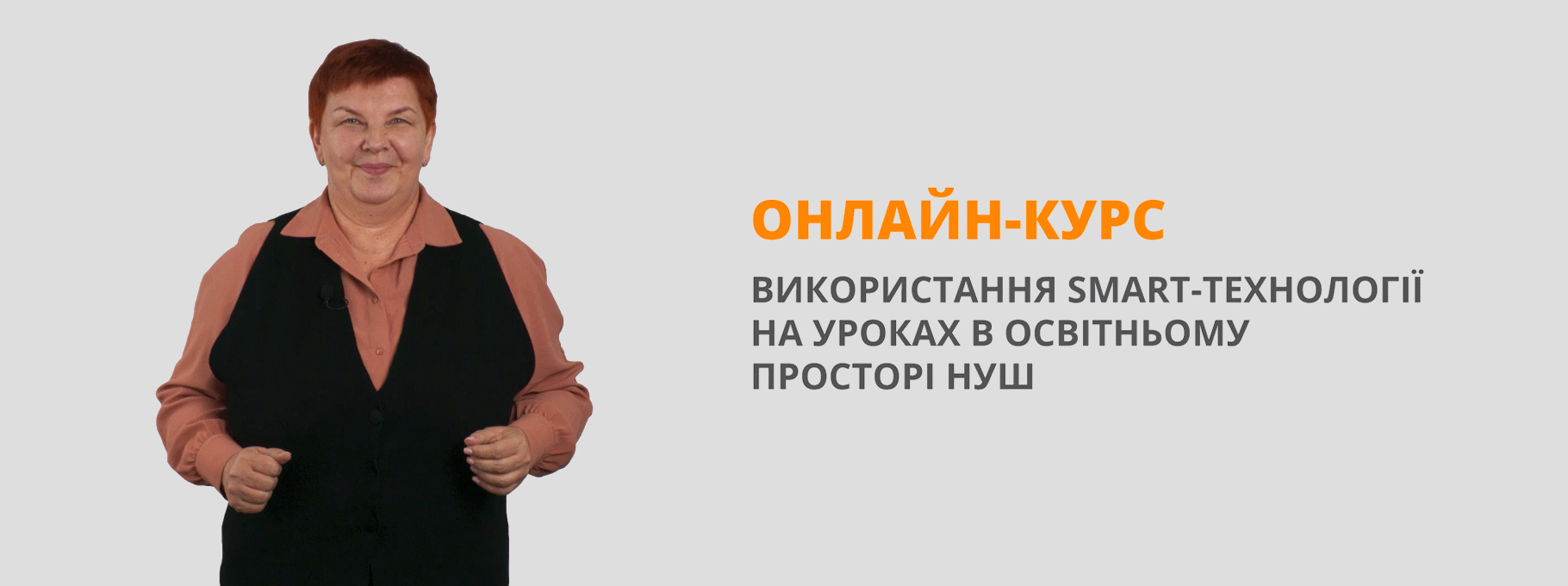Практичне заняття "Молодь України за здоровий спосіб життя. Скажи наркотикам-"ні""
Практичне заняття № 50
Тема: Життя молоді в Україні. Тинейджери сьогодні. Скажи наркотикам – ні.
Мета:
Освітня:
1) розвивати уміння аудіюванія з метою отримання конкретної інформації;
2) розвивати уміння переглядового читання;
3) формувати уміння діалогічної мови з опорою на задану модель;
Розвиваюча:
1) розвивати пам'ять і розумову діяльність студентів,
2) розвивати уміння аргументувати свою точку зору,
3) розвивати мовну здогадку, загальні і освітні навички, що дозволяють удосконалювати навчальну діяльність по опануванню англійської мови;
4) розширювати кругозір студентів.
Виховна:
- виявити і обговорити основні проблеми молоді, визначити причини їх виникнення і знайти способи їх рішення
- навчити аналізувати навколишню дійсність з правової точки зору;
- розвивати самосвідомість і ціннісну орієнтацію студентів;
- спонукати до запобігання правопорушенням, усвідомлення відповідальності за здійснення дій, заборонених мораллю і правом;
- формувати потреби усвідомлення свого права на власну позицію, уміння говорити «ні».
Студенти повинні знати: правила вживання узгодження граматичних часів у непрямій мові.
Студенти повинні вміти: читати і розуміти текст, розповідати про своє ставлення до проблеми наркоманії серед підлітків та молоді в Україні.
Обладнання заняття: індивідуальні завдання студентів, лексичні картки, граматичні таблиці, аудіозапис, аудіомагнітофон .
Хід заняття.
- Підготовка до сприйняття іншомовного мовлення.
Aim 1.1 Повідомлення теми та мети заняття.
Today we’ll touch upon some problems of drug addiction nowadays. Besides, you’ll make up your own dialogues and translate a lot of sentences using the material of the previous lessons.
Warm-up 1.2 Уведення в іншомовну атмосферу. Бесіда викладача з групою на відпрацьовування вивченого мовленнєвого етикету.

“There is a fountain of youth: it is your mind, your talents, the creativity you bring to your life and the lives of people you love. When you learn to tap this source, you will truly have defeated age.”
Sophia Loren quotes (Italian film Actress, b.1934)
“In youth we learn; in age we understand.”
Marie Von Ebner-Eschenbach quotes (Austrian novelist, 1830-1916)
- Основна частина заняття.
Check on the Home-task 2.1 Перевірка домашнього завдання
Reading. 2. 2 Пред’явлення тексту для читання
Grammar box. 2.3 Повторення граматичного матеріалу.
Speaking. 2.4Активізація нового лексичного матеріалу заняття
Reinforcement 2.5 Закріплення навчального матеріалу.
3. Заключна частина заняття.
Summarizing questions 3.1 Контрольні питання
Home-task. 3.2 Домашнє завдання
Summarizing. 3.3 Підведення підсумків.
2.1 Check on the Home-task / Перевірка домашнього завдання
-Let’s check up how well you’ve read and translated the text. But before let’s revise the new topical words Now I want you to have “a dictation in motion”. I will devide you into two groups. One student from each group will come up to my table , read the word, try to remember it and tell it to his group. The group have to write this word into the note-book and translate it .The winner is that group which gives more right variants. (See appendix1)
to be fashionable
kinds of violence
adults
admit
AIDS
to be associated with
poverty
to sent to prison
drug or alcohol addiction
changes of our society
to choose own lifestyle
to be responsible for
freedom and rights
on the one hand
on the other hand
misunderstanding
to be indifferent to
to get upset or depressed
to increase
Warming up.
Teacher: Nowadays, more and more social problems are associated with being young. A few years ago alcohol, fights, killing were more problems for adults than for young people. But now alcohol, drugs, violence and AIDS are more and more associated with youngsters.
Almost half of teenagers have an experience with drugs, alcohol and sex under age of 16 in our country. In Ukraine every day 211 teenagers are arrested for drug addiction, 437 teenagers are arrested for alcohol drinking. 9% teenagers under age of 12-14 drink alcohol regularly. 31% - under age of 15-17. A lot of teenagers who have drug and alcohol addiction almost never believe that they are dependent. These things are often combined with family, school and social problems. Now you see the drug and alcohol problems are the main problems of young people in the world. You also understand that it is sometimes impossible to solve them. But people try. And today at the lesson we’ll speak about some of them.
Brainstorm activity.
На дошці розвішені зображення речей або понять, які асоціюються із словом «наркотик»
Teacher: Let’s try to remember the necessary words and expressions which are associated with the word “drugs”.
Teacher: Look at the blackboard. What awful words we see. Now you remember what words and expressions are associated with the word “drugs”.
P1: Yes, we know them. They are violence, crime, gang, death, danger, addiction, degradation, rebellion. насильство, злочинність, банди, смерть, небезпека, наркоманія, деградація, бунт.
2.2 Reading. / Пред’явлення тексту для читання. “Some good ideas not take drugs”
2.2.1 Pre-reading activities. Teacher: These are the new words on the topic we are going to discuss today at our class. I would like you to repeat them after me. Mind your sounds, please.
Task 1 Remember the following words and word combinations.
|
drug use |
вживання наркотиків |
|
to cause |
спричиняти, викликати |
|
to lose your ability |
втратити здатність |
|
to undergo a complete personality change |
повна зміна особистості |
|
influence of drugs |
вплив наркотиків |
|
to remain |
залишатись |
|
to avoid drugs |
уникати наркотиків |
|
poison |
отрута |
|
disease |
хвороба |
|
Hepatitis C |
гепатит С |
|
AIDS |
СНІД |
|
to use up |
виснажувати |
|
to become more prone to disease |
стати більш схильними до хвороб |
|
nightmare |
жах |
|
to hurt those you love |
спричиняти біль, тим кого любиш |
|
a prison sentence |
позбавлення волі |
|
to grow |
вирощувати |
|
the natural habitat of creatures |
природне існування живих істот |
|
criminals |
злочинці |
|
victim |
жертва |
|
violence |
насильство |
|
fear& suspicion and misery in our communities |
страх, підозрілість і страждання в наших спільнотах |
|
to support this criminal infrastructure |
підтримувати злочинну інфраструктуру |
|
childbearing |
дітонародження |
|
abuse of drugs |
зловживання наркотиками |
|
male |
чоловіча стать |
|
females |
жіноча стать |
|
to be underweight and to suffer from birth complication |
бути маленької ваги і страждати від ускладнень |
|
damage |
збиток |
Teacher: I would like you, students, first find the nouns and read them and then find the verbs and read them as well.
Task 2.
Teacher: First of all let’s find out what vocabulary we can associate with drugs.

Task3.
Teacher: Read the group of words and find the odd word to remember the new active vocabulary better.
- drug use; abuse of drugs; to avoid drugs; drug addict
- disease; poison; Hepatitis C; childbearing; AIDS
- male; gentleman; criminals; lady; females
- misery ; happiness; fear; violence; suspicion
- to undergo a complete personality change; to become more prone to disease; to suffer from birth complication;to become strong and healthy; to damage one's physical appearance ; to lose enthusiasm for life;
2.2.2 While-reading.
Task1. Read and understand the text.
Some good ideas not take drugs
1. Drugs mess with your mind
Drug use can cause you to lose your ability to remember things, to think clearly and to study properly. Drug use can also cause people to act in strange unpredictable ways. A person can undergo a complete personality change when under the influence of drugs. Since drug can remain in the body for many years after they were taken, the effect on the mind can last a long time. Don't lose your mind! Avoid drugs.
2. Drugs mess with your body
Drug use can make you ill and an overdose can kill. Drugs are poisons after all. The list of diseases you can catch as a result of using drugs is very long and includes Hepatitis C and AIDS. Since drugs also use up your body's supply of vitamins and minerals, you become more prone to diseases. Why be a loser? Stay healthy!
3. Drugs mess with your life
Drug use that seems a "cool" idea in the beginning can turn into a living nightmare that includes accidents, hospitalisation, a criminal record, hurting those you love, destroyed relationships, a prison sentence and death. Drug users often lose their enthusiasm for life, give up sports and hobbies. Taking drugs definitely gives you a new lifestyle, but it is the lifestyle of a sad loser with no prospects.
4. Drugs mess with the planet
Many drugs are grown in Third World countries. The drug barons involved cut down forests for space to grow the drugs, thus destroying the natural habitat for thousands of creatures and upsetting the ecological balance. Buying and taking drugs encourages more natural forest to be destroyed.
5. Drugs mess with society
Criminals manufacture and sell drugs. They do not care what effects the drugs have on their victims; they are only interested in the money. These criminals terrorise ordinary people and society, using violence against anyone who tries to stop them. These criminals establish a social environment where there is no respect for law & order, only respect for violence. This generates fear, suspicion and misery in our communities. Buying and taking drugs supports this criminal infrastructure.
6. Drugs mess with your sexual life and childbearing.
There is evidence that abuse of drugs can lead to impotence in males. Certainly, abuse of drugs in females can affect unborn children, with the babies of drug addicts far more likely to be underweight and to suffer from birth complications. The damage that drug use can do to one's physical appearance is very obvious.
Drugs are for losers…
2.2.3 Post-reading activities
Task1. Answer the questions on the text.
- What is the text about? What issues does this text draw our attention at?
- This text contains good arguments not to take drugs, doesn’t it?
- What can drugs mess with?
- How does drug abuse mess with our mind?
- Drugs are considered to be poisons. How do they mess with our body?
- Drugs are known to make the life cool. Do they help people to live a happy full of dreams and hopes life?
- Is it legal to sell drugs in our country? Who sells drugs? Do the criminals care about the drug addict? What are they interested in?
- How does drug abuse affect the sexual life of young people?
- Is there a future for the nation, if 50 percent of its young people are drug addicts? What do you think?
- If you were an antidrug activist what slogan you would offer?
Variants of possible students’ answers:
- This text is about drug abuse. This text draws our attention at some good ideas not take drugs.
- Yes, it does. We can learn many useful arguments not to take drugs.
- Drugs are known to mess with our mind, body, life, society, sexual life and childbearing.
- Drug can cause us to lose our ability to remember things, to think clearly and to study properly and to act in strange unpredictable ways.
- Drugs are poisons and we become more prone to diseases.
- A"cool" life od drug addict can turn into a nightmare with accidents, hospitalisation, a criminal record, hurting those you love, destroyed relationships, a prison sentence and death
- It is not legal to sell drugs in our country. Only criminals sell drugs. The criminals do not care about the drug addict. They are they interested in money. Drug addicts are victims of the criminals enrichment.
- Everybody knows drug abuse affects the sexual life of young people very badly. It leads to impotence in males and females can not give a birth to a healthy child.
- I am absolutely sure there is no any future for the nation if 50 percent of its young people are drug addicts.
- If I were an antidrug activist I would offer several slogans such as: “Don't lose your mind! Avoid drugs”, “Why be a loser? Stay healthy!” “Drug addict is a sad loser with no prospects!”, “Drugs are for losers…”
Task 2 Fill in the scheme. Drugs mess with…….
 Teacher: You can see a scheme in your worksheets. I want you to fill it in according to the text and then we shall discuss the problem of drug abuse in Ukraine.
Teacher: You can see a scheme in your worksheets. I want you to fill it in according to the text and then we shall discuss the problem of drug abuse in Ukraine.
This is a sample of possible student’s scheme.
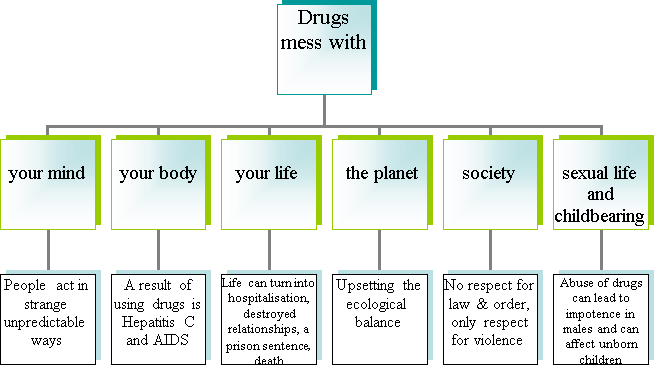
Task 3. Discussing in groups.
Для одночасного включення усіх учасників спілкування в активну роботу з різними партнерами можна використовувати синхронне говоріння у парах змінного складу, а саме прийом «карусель» (Merrygoround). Цей прийом використовують для досягнення різноманітних цілей, у тому числі й для тренування у діалогічному та монологічному мовленні, роботи з граматичними структурами. Студентам пропонуються перелічені сфери життя, на які негативно впливає вживання наркотиків.
Teacher: People often associate these words and expression with drug usage. What is your attitude towards the following opinions about drugs and drug addiction? You will discuss the opinions from the schemes. Give reasons. Explain us why you think so. Ask other groups.
P1: Drugs ruin our dreams. They make our lives unhappy. Do you approve of it?
P2: I think this opinion is absolutely right, because drugs destroy people. Drug addiction causes to loose everything, financially and emotionally.
P3: Drugs cause people to act in strange ways. Do you approve of it?
P4: I know people can lose their mind. They can’t think clearly and study.
P5: Drugs are poisons. Drug use can make people ill. Do you approve of it?
P6: Everybody knows Hepatitis C and AIDS are results of using drugs
P7: The criminals who sell drugs terrorise ordinary people and society, using violence. Do you approve of it?
P8: That’s true! They do not care what effects the drugs have on their victims; they are only interested in the money.
P19: Drug abuse can damage childbearing. Do you approve of it?
P10: The babies of drug addicts are known to be underweight and to suffer from birth complications.
2.3 Grammar box./ Граматичне повторення.
Узгодження часів у непрямій мові Sequence of Tenses
Teacher: Узгодження часів - це залежність часу дієслова присудка у залежному реченні від часу дії головного речення. Якщо дієслово присудок вживається у минулому часі (Past Indefinite), у дієслово присудок у залежному реченні повинен вживатись в одному з минулих часів англійської мови. Зверніть увагу: 1) Для вираження теперішньої дії у залежному реченні вживається Past Indefinite або Past Continuous. 2) Для вираження минулої дії у залежному реченні вживається Past Perfect (See appendix 2,3)
Не didn't know that overdose could kill.
не знав може вбити
Не told me he was visiting his drug addict friend.
сказав відвідує зараз
He said he had written a poster “Avoid drugs” the day before.
сказав написав
 I hoped that Government would not allow any new drug to be prescribed by a doctor
I hoped that Government would not allow any new drug to be prescribed by a doctor
сподівався не дозволить

 Sequence of Tenses
Sequence of Tenses
Present Indefinite----- Past Indefinite Ved, II ; didn’t V
I thought that he lived in Kiev.
Present Perfect --------Past Perfect had +Ved, III
I thought that he had bought a book that morning.
Present Continuous--- Past Continuous was;were + Ving
I thought that he was reading a book.
Past Indefinite ---------Past Perfect had +Ved, III
I thought that he had bought a book .
Future Indefinite--- Future-in-the Past would + V
He said that he would read a book the next day.
 2.3.1
2.3.1![]()





Teacher: Read the story and tell your groupmate what you have read. Use reported speech.
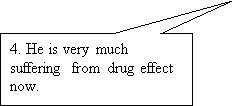

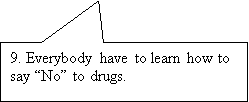
1. Alex said that he____________________________________________________.
2. ________________________________________________________________________
3. ________________________________________________________________________
4. ________________________________________________________________________
5. ________________________________________________________________________
6. _________________________________________________________________________
7. ________________________________________________________________________
8. ________________________________________________________________________
9. ________________________________________________________________________
2.4 Speaking . / Активізація нового лексичного матеріалу заняття
Role-play - Students are asked to imagine a short scenario where teens, interacting with their peers, would have to rely on resistance strategies to avoid using drugs. Students are then asked to join another pair (or two) of students and role-play their scenario for the others.
So, what do you do when someone pressures you to try drugs?
9 ways to say "No" to drugs
1. I can't do drugs. I'm trying to get an athletic scholarship and I have to keep my body healthy.
2. My parents (or coach) has threatened to give me a drug test. I'd better not try that…
3. I can't do drugs. I'm not that smart to begin with…I'd like to hold on to all the brain cells I have.
4. If I mix drugs with my anti-psychotic medication, I might accidentally kill you.
5. (Girls) Can't smoke pot today. I hear drugs make you hungry and I'm on a diet. I want to look good in my new jeans tomorrow
6. I can't do drugs. If my parents found out they might die…and they're still earning my inheritance…
7. I was born with a heart condition. If I take that, I could have a heart attack and die.
8. I can't take drugs. Drugs are deadly. If I take drugs, my parents will kill me.
9. Smoking pot makes you fat, stupid, your teeth yellow and your clothes stink…I'll pass…
Dialogue:
Boy: Hi! Are you bored, girls?
Girl 1: Well, not very much. We are enjoying music! We like it here, don’t we?
Girl 2: Yes, we do. This is a cool club!
Boy : Would you like to have more fun? I have something great for you.
Girl1: That depends! What is it?
Boy : This is something that makes you feel happy and cheerful. This is a weed. You have
to smoke it. Don’t be afraid!
Girl 2: Oh, my lord! Isn’t it a drug? This is a drug, isn’t? Do I hear you well? You are
offering us to do drugs, aren’t you?
Girl 1: Well, well, well, stop it! I can't do drugs. I'm not that smart to begin with…I'd like to
hold on to all the brain cells I have.
Girl 2: As for me I can't smoke drug today. I hear drugs make you hungry and I'm on a diet.
I want to look good in my new jeans tomorrow.
Boy: It’s up to you, babies.
3.1 Summarizing questions ./Контрольні питання
Teacher: Our lesson is about to be finished. It’s time to see what you have learned. Answer my questions, please.
- What topic were we discussing today at our lesson?
- Have you remembered new vocabulary? Tell at least 3-5 new words you have learned. Keep the chain.
- What grammar material have we revised today?
- What is the title of the text we have read today? Was it hard to understand it?
- What kind of work or exercise did you like the most?
3.2 Home-task./ Домашнє завдання
Teacher: Your home assignment for the next lesson is:
1. Do the tasks of the worksheet (see appendix)
3.2Summarizing. /Підбиття підсумків.Today at our lesson we’ve learned some material which I consider to be very important and useful for you. Try to systemize it! Your marks are……..
Worksheet for Developing strategies to say No! to drugs
1. Reasons and Consequences
Name:____________________________ Group:______
1. Reasons for taking drugs
My list My partner's list
______________________ ______________________________
______________________ ______________________________
______________________ ______________________________
______________________ _______________________________
2. Based on your personal knowledge and with the help of your notes, complete chart below with one word in a frame
Harmful consequences of a road to nowhere
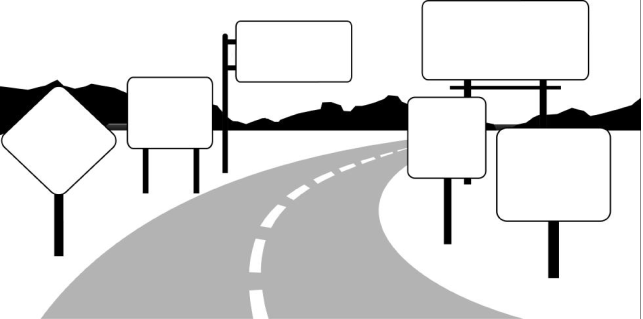 3. With your partner, find at least 5 Positive consequences of not taking drugs and list them in the appropriate section.
3. With your partner, find at least 5 Positive consequences of not taking drugs and list them in the appropriate section.
Harmful consequences of using drugs
1.
2.
3.
4.
5.
Positive consequences of not using drugs
1.
2.
3.
4.
5.
4. Case histories and Resistance strategies. Read and retell the following texts. From the bellow examples, find resistance strategies that can help you say No! to drugs, and write them. Add some of your own resistance strategies.
Alex: My friend and I were just hanging out in her basement when her brother came down. He told us that he thought we were ready to smoke weed. I was only thirteen. He took out a joint and my friend looked straight into my eyes. She took it in her hands and took a long puff and passed it to me. I looked at the rolled-up joint for so long until I got up and caught the next bus home. Now, I'm not going to deny it, I was going to do it, but then I thought of everything that was going for me at that time. I was part of the volleyball team, I had a lot of friends, and I was doing well in school. I was happy when I walked out that door.
Gerry: I was at this dance with some friends and someone came up to me and asked me: "Do you want to smoke some weed?" I was shocked because no one had ever offered me weed, and I just said: "Maybe later." I smiled and I walked away. Two hours later, he asked me again. "No, it's ok, maybe next time." I smiled and he walked away.
Student’s worksheet
2.1
Task 1. “A dictation in motion”. ___________________________________________________________________________________________________________________________________________________________________________________________________________________________________________________________________________________________________________________________________________________________________________________________________________________________________________________________________________________________________________________________________________________________
_______________________________________________________________________________________________________________________________________________________________________________________________________________________________________
2.2 Reading. / Пред’явлення тексту для читання. “Some good ideas not take drugs”
2.2.1 Pre-reading activities.
Task 1 Remember the following words and word combinations.
|
drug use |
вживання наркотиків |
|
to cause |
спричиняти, викликати |
|
to lose your ability |
втратити здатність |
|
to undergo a complete personality change |
повна зміна особистості |
|
influence of drugs |
вплив наркотиків |
|
to remain |
залишатись |
|
to avoid drugs |
уникати наркотиків |
|
poison |
отрута |
|
disease |
хвороба |
|
Hepatitis C |
гепатит С |
|
AIDS |
СНІД |
|
to use up |
виснажувати |
|
to become more prone to disease |
стати більш схильними до хвороб |
|
nightmare |
жах |
|
to hurt those you love |
спричиняти біль, тим кого любиш |
|
a prison sentence |
позбавлення волі |
|
to grow |
вирощувати |
|
the natural habitat of creatures |
природне існування живих істот |
|
criminals |
злочинці |
|
victim |
жертва |
|
violence |
насильство |
|
fear& suspicion and misery in our communities |
страх, підозрілість і страждання в наших спільнотах |
|
to support this criminal infrastructure |
підтримувати злочинну інфраструктуру |
|
childbearing |
дітонародження |
|
abuse of drugs |
зловживання наркотиками |
|
male |
чоловіча стать |
|
females |
жіноча стать |
|
to be underweight and to suffer from birth complication |
бути маленької ваги і страждати від ускладнень |
|
damage |
збиток |
Task 2. “Associations”.

Task3. Read the group of words and find the odd word to remember the new active vocabulary better.
- drug use; abuse of drugs; to avoid drugs; drug addict
- disease; poison; Hepatitis C; childbearing; AIDS
- male; gentleman; criminals; lady; females
- misery ; happiness; fear; violence; suspicion
- to undergo a complete personality change; to become more prone to disease; to suffer from birth complication;to become strong and healthy; to damage one's physical appearance ; to lose enthusiasm for life;
2.2.2 While-reading.
Task1. Read and understand the text.
Some good ideas not take drugs
1. Drugs mess with your mind
Drug use can cause you to lose your ability to remember things, to think clearly and to study properly. Drug use can also cause people to act in strange unpredictable ways. A person can undergo a complete personality change when under the influence of drugs. Since drug can remain in the body for many years after they were taken, the effect on the mind can last a long time. Don't lose your mind! Avoid drugs.
2. Drugs mess with your body
Drug use can make you ill and an overdose can kill. Drugs are poisons after all. The list of diseases you can catch as a result of using drugs is very long and includes Hepatitis C and AIDS. Since drugs also use up your body's supply of vitamins and minerals, you become more prone to diseases. Why be a loser? Stay healthy!
3. Drugs mess with your life
Drug use that seems a "cool" idea in the beginning can turn into a living nightmare that includes accidents, hospitalisation, a criminal record, hurting those you love, destroyed relationships, a prison sentence and death. Drug users often lose their enthusiasm for life, give up sports and hobbies. Taking drugs definitely gives you a new lifestyle, but it is the lifestyle of a sad loser with no prospects.
4. Drugs mess with the planet
Many drugs are grown in Third World countries. The drug barons involved cut down forests for space to grow the drugs, thus destroying the natural habitat for thousands of creatures and upsetting the ecological balance. Buying and taking drugs encourages more natural forest to be destroyed.
5. Drugs mess with society
Criminals manufacture and sell drugs. They do not care what effects the drugs have on their victims; they are only interested in the money. These criminals terrorise ordinary people and society, using violence against anyone who tries to stop them. These criminals establish a social environment where there is no respect for law & order, only respect for violence. This generates fear, suspicion and misery in our communities. Buying and taking drugs supports this criminal infrastructure.
6. Drugs mess with your sexual life and childbearing.
There is evidence that abuse of drugs can lead to impotence in males. Certainly, abuse of drugs in females can affect unborn children, with the babies of drug addicts far more likely to be underweight and to suffer from birth complications. The damage that drug use can do to one's physical appearance is very obvious.
Drugs are for losers…
Task 2 Fill in the scheme. Drugs mess with…….
Fill in the scheme according to the text and then we shall discuss the problem of drug abuse in Ukraine.
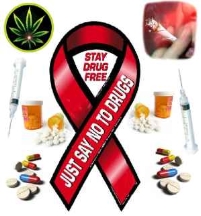
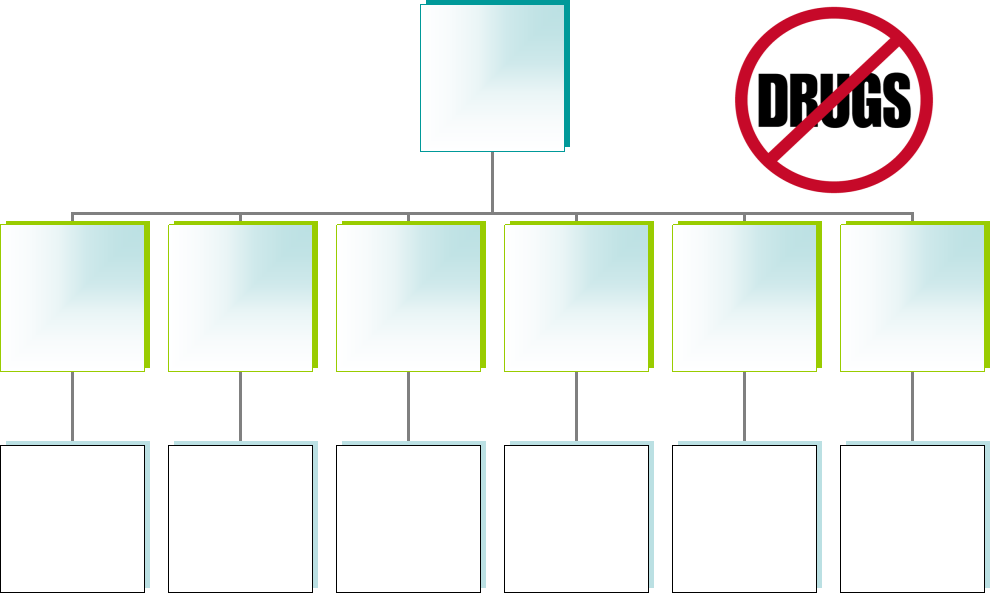
2.3 Grammar box./ Граматичне повторення.
 2.3.1
2.3.1![]()





Teacher: Read the story and tell your groupmate what you have read. Use reported speech.



1. Alex said that he__________________________________________________________.
2. ________________________________________________________________________
3. ________________________________________________________________________
4. ________________________________________________________________________
5. ________________________________________________________________________
6. ________________________________________________________________________
7. ________________________________________________________________________
8. ________________________________________________________________________
9. ________________________________________________________________________
2.4 Speaking . / Активізація нового лексичного матеріалу заняття
So, what do you do when someone pressures you to try drugs?
9 ways to say "No" to drugs
1. I can't do drugs. I'm trying to get an athletic scholarship and I have to keep my body healthy.
2. My parents (or coach) have threatened to give me a drug test. I'd better not try that…
3. I can't do drugs. I'm not that smart to begin with…I'd like to hold on to all the brain cells I have.
4. If I mix drugs with my anti-psychotic medication, I might accidentally kill you.
5. (Girls) Can't smoke pot today. I hear drugs make you hungry and I'm on a diet. I want to look good in my new jeans tomorrow
6. I can't do drugs. If my parents found out they might die…and they're still earning my inheritance…
7. I was born with a heart condition. If I take that, I could have a heart attack and die.
8. I can't take drugs. Drugs are deadly. If I take drugs, my parents will kill me.
9. Smoking pot makes you fat, stupid, your teeth yellow and your clothes stink…I'll pass…

 Sequence of Tenses
Sequence of Tenses
Present Indefinite----- Past Indefinite Ved, II ; didn’t V
I thought that he lived in Kiev.
Present Perfect --------Past Perfect had +Ved, III
I thought that he had bought a book that morning.
Present Continuous-- Past Continuous was;were + Ving
I thought that he was reading a book.
Past Indefinite ---------Past Perfect had +Ved, III
I thought that he had bought a book .
Future Indefinite--- Future-in-the Past would + V
He said that he would read a book the next day.
 Sequence of Tenses
Sequence of Tenses




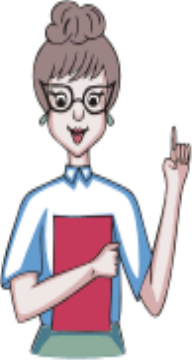 …she taught children at school
…she taught children at school
… he was reading a book


 … she had painted a nice picture
… she had painted a nice picture
… he would make a funny movie



Використання інтерактивних технологій у навчанні іноземних мов
Від сучасного навчального закладу вимагається запровадження нових підходів до навчання, що забезпечують розвиток комунікативних, творчих і професійних компетенцій та стимулюють потребу майбутнього фахівця у самоосвіті на основі змісту та організаціїї навчального процесу. Метою навчання іноземним мовам у вищих навчальних закладах є формування у студентів професійної комунікативної компетенції шляхом розвитку та вдосконалення усіх видів мовленнєвої діяльності: читання, говоріння, письма та аудіювання.
Однією з перепон, яка стоїть на шляху успішного оволодіння іноземною мовою в вищому технічному навчальному закладі, є недостатня, а інколи й відверто низька мотивація студентів до вивчення мови. Саме тому особливий інтерес представляють інтерактивні технології, метою яких є створення комфортних умов навчання, за яких кожен студент відчує свою успішність, інтелектуальну спроможність. В основу такого навчального процесу закладено співробітництво і продуктивне спілкування, спрямоване на спільне розв’язання проблем, формування здібностей виділяти головне, ставити цілі, планувати діяльність, розподіляти функції, відповідальність, критично міркувати, досягати значимих результатів. Тому потрібно більше активізувати процес навчання, використовуючи відповідні інтерактивні технології.
Термін „інтерактивна педагогіка” відносно новий: до наукового обігу його ввів у 1975 р. німецький дослідник Ганс Фріц. У своїх дослідженнях він визначив мету інтерактивного процесу – це зміна і поліпшення моделей поведінки його учасників. Аналізуючи власні реакції та реакції партнера, учасник змінює свою модель поведінки і свідомо засвоює її. Це дозволяє говорити про інтерактивні методи як процес інтерактивного виховання. Лінгвістичне значення слова «interactive», представлене в іншомовних словниках, розтлумачує поняття „інтерактивності”, „інтерактивного” як взаємодію, або того, що взаємодіє, впливає один на одного.
Інтерактивність у навчанні можна пояснити як здатність до взаємодії, навчання у режимі бесіди, діалогу, дії. Отже, у дослівному розумінні інтерактивним може бути названий метод, в якому той, хто навчається, є учасником, тобто здійснює щось: говорить, управляє, моделює, пише, малює тощо. Він не виступає лише слухачем, спостерігачем, а бере активну участь у тому, що відбувається, власне створюючи це явище.
Сутність інтерактивного навчання полягає у взаємонавчанні, груповій формі організації освітнього процесу із реалізацією активних групових методів навчання для вирішення дидактичних завдань. Педагог при цьому виконує функції помічника в роботі, консультанта, організатора, стає одним із джерел інформації. Однак, студент і викладач виступають як рівноправні суб’єкти навчального процесу. Інтеракція виключає домінування будь-якого учасника, думки, точки зору над іншими, але має враховувати конкретний досвід та практичне застосування. Під час такого діалогового навчання студенти вчаться критично мислити, розв’язувати складні проблеми на основі аналізу обставин і відповідної інформації, зважуючи альтернативні думки, приймати продумані рішення, брати участь у дискусії, спілкуватись з іншими людьми.
Організації процесу багатосторонньої комунікації сприяє використання відповідних інтерактивних методів навчання, які спрямовані на розвиток творчих здібностей студентів, орієнтують на діяльність, що стимулює активність та «винахідливість». До них можна віднести наступні: мозковий штурм, метод проектів, рольові та ділові ігри, дискусії, дебати, круглі столи, методи типу „мереживна пилка”, „обери позицію”, „шкала думок” та ін.
Викладач повинен зважати на рівень володіння мовою студентами, на рівень сформованості комунікативних навичок. Потрібно слідкувати, щоб теоретичні знання в процесі активного навчання ставали усвідомленими, щоб студент розвивав і удосконалював не лише знання з мови, а й міг пов’язувати їх з майбутньою професійною діяльністю.
Технологія використання таких форм навчання являє собою поетапне, логічно побудоване використання форм активного навчання від простіших до складніших і включає в себе: засвоєння ігрових прийомів шляхом введення їх в практику проведення занять; розширення використання на уроках ігрових ситуацій, елементів дискусій, обговорень, проведення в ігровій формі підсумкових занять з теми.
Так, використання рольових ігор, в яких студенти спілкуються в парах або в групах не лише дозволяє зробити заняття більш різноманітним, а й дає можливість студентам проявити мовленнєву самостійність, реалізувати комунікативні вміння та мовленнєві навички. Вони можуть допомагати один одному, успішно коригувати висловлення своїх співрозмовників, навіть якщо викладач не дає такого завдання.
Доцільність, ефективність і методи впровадження інтерактивних технологій на заняттях англійської мови є головною метою створення даної методичної розробки показового заняття . На заняттях англійської мови необхідно використовувати прийоми ситуативного моделювання та опрацювання дискусійних питань, технології колективно – групового та кооперативного навчання. Звичайно, що для забезпечення практичного володіння предметом використовуються такі, важливі, компоненти як:
- запам’ятання студентами певної кількості матеріалу, що подається в системі;
- розвиток навичок оперування мовним матеріалом;
- розвиток комунікативних вмінь;
Дане заняття побудовано таким чином, щоб максимально надати студентам можливість розмовляти іноземною мовою, створити такі умови, за яких говоріння за заданою темою було б природно мотивованим, можливість висловлювати думки та обговорювати їх. Вважаю, що необхідно надавати важливого значення створенню в групі клімату взаємосприйняття, акцентування позитивного, запобігання негативному, створення почуття довіри, поваги до кожного для найновішої реалізації кожним своїх можливостей. На занятті важливо створити атмосферу загальної релаксації і взаємної довіри. В невимушеній атмосфері студент відчуває себе вільним і рівноправним партнером, студенти не повинні відчувати страх за неправильність сказаного. Недаремно слово “інтерактив” (пер. з англійської “inter” – “взаємний”, “act” – діяти) означає взаємодіяти. Суть інтерактивного навчання і полягає в тому, що навчальний процес відбувається за умови постійної активної взаємодії всіх студентів. За умови використання інтерактивних технологій на занятті підвищується результативність навчання, стимулюється вивчення мови, розумова та творча активність студентів, підвищується зацікавленість до вивчення іноземної мови. тощо.
Дослідники теорії інтерактивного навчання стверджують, що для роботи за інтерактивними технологіями викладачу необхідно змінити свої особисті підходи до навчання.
З групового (кооперативного) навчання на своїх заняттях найбільше використовується робота в парах, "Два - чотири - всі разом", "Карусель", роботу в малих групах, "Акваріум". Для забезпечення швидкого та ефективного включення студентів в інтерактивну діяльність пропонуються їм пам'ятки, які містять опис алгоритму діяльності (послідовний перелік дій, які вони мають здійснювати у тій чи іншій навчальній ситуації
Під час роботи в парах можна виконувати так вправи: обговорити завдання, короткий текст; взяти інтерв'ю, визначити ставлення (думку) партнера до того чи іншого питання, твердження і т.д.; зробити критичний аналіз роботи один одного; сформулювати підсумок теми, що вивчається тощо.
З фронтальних технологій інтерактивного навчання надаю первагу таким : "Мікрофон", незакінчені речення (поєднується з вправою "Мікрофон"), "Мозковий штурм" ,"Навчаючи - вчуся", "Дерево рішень" та ін.
Найбільш вдалими формами парної і групової роботи вважаються:
· внутрішні (зовнішні) кола (inside/outside circles);
· мозковий штурм (brain storm);
· обмін думками (think-pair-share);
Апелюючи висловлюванням Конфуція «Скажи мне – и я забуду; покажи мне – может быть, я запомню; вовлеки меня – и я пойму», можна сказати, що інтерактивне заняття – це оптимальный досвід активної співпраці викладача та студента. Треба зазначити, що переобтяжувати заняття інтерактивними технологіями не варто (1-2 за заняття). Інтерактивні технології – це не самоціль. Кожний викладач повинен чітко формулювати цілі заняття та підбирати ті технології, які підвищать мотивацію, пізнавальну активність студентів!
Висновки
Отже, інтерактивні технології навчання при вивченні іноземних мов потребують від усіх учасників навчального процесу розвитку комунікаційних умінь, навичок роботи в парах і групах, вмінь аргументувати й дискутувати тощо. В цілому інтерактивне навчання спілкуванню іноземною мовою створює сукупний ефект, який виявляється в тому, що на фоні програмного засвоєння знань формуються:
- вміння співробітничати, продуктивність якого характеризується зміною стратегії взаємодії, можливості залучати студентів у навчальну взаємодію і характером групової взаємодії;
- комунікативна компетентність, що визначається зміною стилю спілкування, усвідомленням бар’єрів спілкування, характером вирішення комунікативних завдань;
- толерантність, яка характеризується сприйняттям інших людей і забезпечує повноту та адекватність спілкування в різних ситуаціях .
Література
Гейхман Л. К., Зуев И. И., Нигматуллова Э. Ф., Попова Г. С. Интерактивный подход и модель дистанционного обучения иностранным языкам. - http://www.iii04.pfo-perm.ru
Гейхман Л.К. Искусство быть и общаться с Другим (Интерактивное обучение). – Пермь: Центр развития образования, 2001.
Мурадова Н.С. Коммуникативносвязующая роль культуры общения студентов технических заведений в интерактивном обучении. – http://www.ostu.ru/conf/ruslang2004/trend2/muradova.htm
Організація навчально-виховного процесу. З досвіду роботи вищих навчальних закладів I-II рівнів акредитації./ Ред.Салмай Н.М., Цибенко Н.В. – Випуск 10. – 2007. – с.80-95.
Полат Е.С. Теоретические основы составления и использования системы средств обучения иностранному языку для средней общеобразовательной школы. Автореф. докт. диссертац. - М., 1989.
Пометун О., Пироженко Л. Сучасний урок: Інтерактивні технології навчання. – К., 2004.
Інтерактивні технології навчання: Теорія, досвід: метод, посіб. Авт.-уклад.: О. Пометун, Л. Пироженко. - К.: А.П.Н., 2002.
РЕЦЕНЗІЯ
Методична розробка з дисципліни „Англійська мова ” розроблена викладачем вищої категорії Шамотою Л.Ф. Методична розробка створена згідно навчального плану.
Беручи до уваги важливість активізації пізнавальної діяльності студентів для успішного оволодіння англійською мовою, автор методичної розробки пропонує методику опрацювання теми, пов’язаної з соціальною проблемою сучасної молоді - наркоманія. При визначенні мети створення методичної розробки було чітко враховано два моменти: розвиток мовлення та активізація зацікавленості студентів оволодіння англійською мовою. Кожний вид роботи у методичній розробці передбачає елементи інтерактивних та стимулюючих методів навчання. Завдання методичної розробки є різними за змістом та складністю, мають на меті розвиток пізнавальної діяльності студентів через такі види завдань, як:
- читання тексту з подальшим його обговоренням за допомогою питально-відповідальної форми роботи;
- синхронне говоріння у парах змінного складу
- виконування різних завдань за підтемами даної практичної роботи, як узагальнення вивченого матеріалу.
Всі завдання спрямовані на реалізацію чотирьох основних видів мовленнєвої діяльності: читання, говоріння, аудіювання та письмо.
Автором методичної розробки підібраний відповідний інформативний матеріал.
Одночасно, значна увага приділяється формуванню мовленнєвої компетенції студентів. Мовний матеріал в достатній мірі характеризує обсяг лексичного запасу студентів, навичок аудіювання та монологічного і діалогічного мовлення. Навчальні завдання, запропоновані викладачем, спонукають студентів до активної діяльності з використанням нетрадиційних форм та методів навчальної роботи і інтерактивної методики навчання.
Викладач вміло та доцільно використовує групову, індивідуальну роботу на занятті та диференційний підхід у навчанні. Було створено умови для об’єктивного оцінювання кожного студента.
Зміст методичної розробки спрямований на досягнення основних чотирьох цілей: практичної, освітньої, розвивальної та виховної.
Дана методична розробка може надати допомогу викладачам англійської мови при ознайомленні студентів з методикою працевлаштування та при опрацюванні вищезазначеної теми, а тому рекомендується для використання як з навчальною, так і контролюючою метою.
Рецензент Т.О. Шопська
Викладач вищої категорії

про публікацію авторської розробки
Додати розробку
